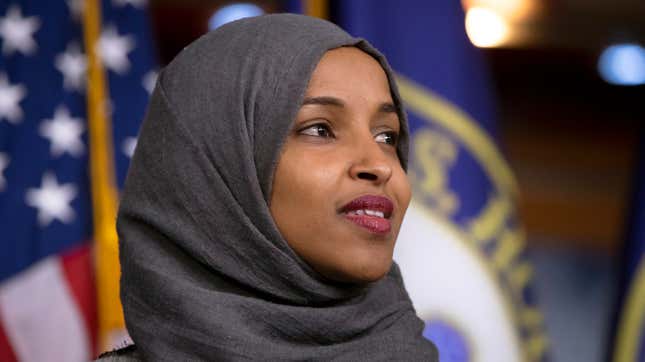

Since she first entered Congress, Ilhan Omar has been under attack, and her words consistently taken out of context. The latest manufactured controversy is over remarks she made in March while speaking at an event held by the Council on American-Islamic Relations, in which she spoke about the increase in anti-Muslim bias after 9/11.
“For too long we have lived with the danger of being a second-class citizen, and frankly, I’m tired of it. And every single Muslim in this country should be tired of it,” Omar said during her speech. “CAIR was founded after 9/11 because they recognized that some people did something and all of us were starting to lose access to our civil liberties.” (Omar misstated the date of CAIR’s founding, which was in 1994.) Given the well-documented rise in anti-Muslim hate crimes in the wake of that attack, and the invasive surveillance Muslim communities were and continue to be subjected to, Omar’s speech feels more like a narration of established facts than anything else. But unsurprisingly, in recent days, rightwing media, pundits, and politicians have seized on the phrase “some people did something” in yet another attempt to discredit Omar and paint her as un-American.
The clip was first circulated by the conservative site the Daily Caller last Tuesday, and was eagerly seized on by Fox News. In a segment that aired the next day, Brian Kilmeade of Fox & Friends shared the clip. “You have to wonder if she’s an American first,” Kilmeade mused. On Thursday, the New York Post published an incendiary cover that featured Omar’s quote, again taken of context, above a photo of the World Trade Center engulfed in flames. “Here’s your something. 2,977 people dead by terrorism,” the headline read. And then on Friday, since all racist conspiracy-adjacent roads eventually reach the White House, Donald Trump tweeted out an edited video of Omar, interspersing her remarks that “some people did something” with footage of the Twin Towers going down in smoke. “WE WILL NEVER FORGET,” he wrote. On Monday morning, he was still continuing to throw fuel on the fire, characterizing Omar as “anti-Semitic,” “anti-Israel,” and “out of control.”
-

-

-

-

-

-

-

-

-

-

-

-

-

-

-

-

-

-

-

-

-

-

-

-

-

-

-

-

-

-

-

-

-

-

-

-

-

-

-

-








































